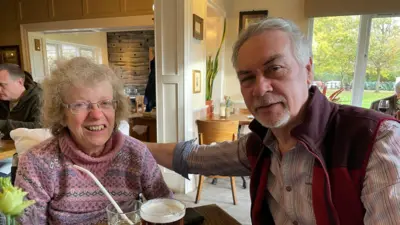We've updated our Privacy and Cookies Policy
We've made some important changes to our Privacy and Cookies Policy and we want you to know what this means for you and your data.
Carers 'missing out on support', says charity
Top Stories
People looking after someone with cancer are missing out on "vital support and benefits", a charity has warned.
An Ipsos MORI survey of 386 carers for Macmillan Cancer Support suggests 49% have no support of any kind.
Just 5% have had a carers' assessment by their local authority to see what assistance they could get.
Macmillan said the survey results showed how "unsupported" the 1.1m carers of people with cancer are.
Almost half of the carers reported they experienced mental health problems such as stress, anxiety and depression, and one in eight (13%) said they experienced physical health problems such as sleep and digestive problems.
Top Stories
One in seven (15%) reported financial issues such as spending more on things like travel to hospital or giving up work.
Top Stories
Carers of people with cancer provide an average of around 15 hours of help each week. In the main, they offer emotional support, with around half helping with errands outside the house.
Many say their own lives are affected, with 20% saying their caring role affects their relationships. Nineteen per cent said it affected their working life while 15% said it had an impact on their finances.
'Under pressure'
Rebecca Guyott, who is 19 and from Essex became a carer for her mother, along with her sisters, when she was diagnosed with bowel cancer in 2010.
She said: "I found it a big strain. At work I often had to leave the office because of the emotional stress. I'd get home and do all the cleaning, washing and cooking as mum could hardly stand, let alone do anything for herself.
"After just a week of this I slept so badly because of the worry and then could barely wake up the next morning to go into work and start all over again.
"Mum's improved now and I'm hoping to return to college, but I still feel under pressure. I didn't even know we could have been entitled to a Carer's Assessment or benefits, it was never mentioned."
CiarГЎn Devane, chief executive of Macmillan Cancer Support, said: "Our research shows how unsupported cancer carers really are in the UK. Carers want to look after their family or friend with cancer - but it is often at the expense of their own mental or physical health.
"Cancer is no longer necessarily a death sentence and this means there is a growing need for people to care for their family member or friend with cancer. Often this is long-term care. But carers need support to cope with the significant demands of their role.
"The statutory sector must increase awareness and uptake of Carers' Assessments. Both health and social care professionals need to be signposting cancer carers for assessments."
David Rogers, chair of the Local Government Association's Community Wellbeing Board, said: "As this report highlights, the sad reality is that many carers don't recognise themselves as such and fail to seek the support to which they are rightly entitled, and which is widely available through their local authority."
Top Stories
More to explore
Most read
Content is not available








